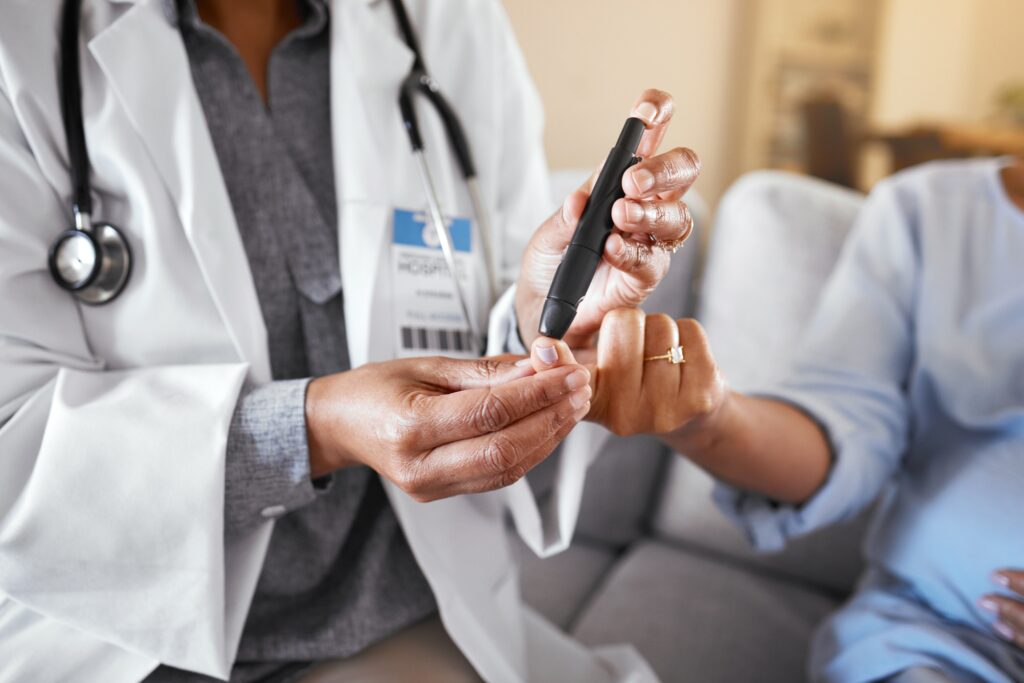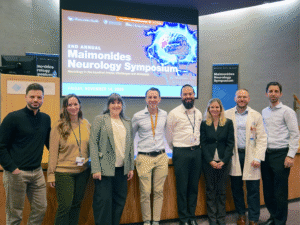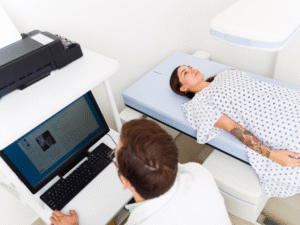Diabetes impacts nearly 10% of pregnancies in the United States every year¹. Left uncontrolled, high blood sugars can cause dangerous complications that threaten both mother and baby.
As a New York State Regional Perinatal Center, we deliver more than 6,000 babies at Maimonides Medical Center annually. To ensure each pregnancy and birth is as healthy as possible, we offer leading diabetes care and education.
“Our services to care for pregnant patients or those trying to conceive marries the best of our maternal-fetal medicine care with Maimonides’ expert diabetes management services,” says Scott Chudnoff, MD, Chair of Obstetrics and Gynecology at Maimonides. “The program is one of many layers in place to safeguard the health of mothers and babies and to ensure all of our patients have access to the tools they need to have the best possible pregnancy outcomes.”
“The unique thing about our program is that we’re specialized and have expertise in the latest technologies that allow us to manage diabetes during pregnancy,” says Rodney McLaren, MD, Director of Maimonides Ambulatory Maternal Specialty Services. “We have all the latest tools to care for every kind of diabetes. That’s a huge advantage for our patients who are pregnant or considering pregnancy.”
The Impact of Diabetes
High blood sugar during or before pregnancy is a health safety threat for both mothers and unborn babies, Dr. McLaren says.
Mothers who have diabetes have a higher risk of a wide variety of complications. They may develop hypertensive disorders of pregnancy, including preeclampsia, and other conditions that could trigger the need for a C-section. They also have a higher risk of miscarriage, stillbirth, or having a difficult delivery because their baby is larger than normal. Our neonatal intensive care unit offers critical care and specialty services for babies who experience diabetes-related complications during delivery and birth.
Evidence shows effectively controlling blood sugar during pregnancy can lower a woman’s risk of these complications. For example, maintaining normal blood sugar levels can reduce a woman’s risk of stillbirth to average².
The Power of Diabetes Education
Reaching women when they’re considering pregnancy or early in gestation can empower them to control their diabetes, leading to a healthier pregnancy, Dr. McLaren says.
“There’s lots of evidence that when you have diabetes in pregnancy programs, you can lower rates of bad outcomes,” he explains. “With increased preconception visits seen at institutions with diabetes in pregnancy programs, patients see lower rates of adverse outcomes because they are involved and have better control over their blood sugars before they get pregnant.”
At Maimonides, we help set our pregnant patients up for success. Our multidisciplinary team of maternal-fetal and fertility experts can help these patients overcome the reproductive challenges that diabetes can present. This team includes physicians, physician assistants, social workers, endocrinologists, and diabetes educators.
During preconception visits, our specialists educate patients on how diabetes will affect their pregnancy and vice versa. We also assist them in creating a management plan that works with their lifestyle to ensure they have the best pregnancy outcome possible.
Diabetes in Pregnancy Care at Maimonides
At Maimonides, we take a team-based approach to caring for patients. We follow the latest guidelines and rely on evidence-based methodologies to deliver personalized care to meet each patient’s needs.
“We pride ourselves in our outlook that every person is unique. We design care plans specific to each patient,” Dr. McLaren says. “We work with them to map out and decipher their lifestyles to provide the best care that minimizes pregnancy complications.”
That also means we’re ready to care for women who weren’t expecting to become pregnant. According to Dr. McLaren, approximately 50% of pregnancies are unplanned. As a result, many patients either don’t know they have diabetes or don’t have their condition under control when they get pregnant. Our specialists at the Maimonides Early Pregnancy Assessment Center can help patients no matter where they are on their pregnancy journey.
“If you have a patient with known prediabetes or diabetes who has an unplanned pregnancy, we want to see them as soon as possible once they know they’re pregnant,” Dr. McLaren says. “As a one-stop shop for reproductive health and early pregnancy care, we have the backing of an entire team of prenatal specialists to help these women get their diabetes under control.”
We offer several services to help patients reach this goal:
- Endocrinology care – We do more than include an endocrinologist in the care of every pregnant patient with diabetes. We also help them establish post-pregnancy care. A Maimonides endocrinologist will work with eachpatient to ensure they receive any necessary follow-up tests they may need to manage their condition.
- Advanced technology – Through our Diabetes Education Center, we provide the latest technologies to support each patient’s diabetes management efforts. With continuous glucose monitors (CGMs) and insulin pumps with manual and automated modes, we help pregnant patients and mothers better monitor their blood sugar in real time. Many of these devices also allow your patients to share their blood sugar data with care teams automatically via the cloud.
- Nutrition – Our registered dietitian nutritionists partner with every patient to design meal plans that help keep their blood sugar in a healthy range. They also teach patients how to make different food choices based on the data provided by their CGM.
Overall, Dr. McLaren says, the maternal-fetal medicine specialists at Maimonides are committed to providing the specialized care every woman with diabetes needs during pregnancy.
“We deliver individual care for the individual patient,” he says. “Our approach to diabetes care in pregnancy is notgeneric — it’s centered around each patient’s unique way of getting the best outcome for their pregnancy.”
Learn more about obstetrics care at Maimonides or call 718-283-9044 to make a referral.




